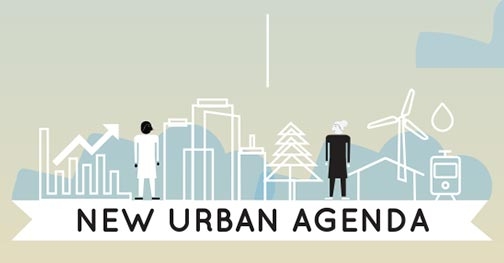On 30. May 2016 an informal meeting of EU Ministers with responsibility for urban affairs took place in Amsterdam, at the initiative of the Dutch Presidency. During this meeting an "Urban Agenda for the EU", also called "Pact of Amsterdam", has been established. The goal is networking and knowledge sharing of city authorities at European level, also to achieve better regulation and the promotion at EU level.
The European Urban Agenda is a joint effort of European Commission, Member States and European Cities Networks to strengthen the recognition of the urban dimension by European and national policy actors. Through the Urban Agenda for the EU, national governments, the European Commission, European institutions and other stakeholders will be working together for a sustainable, innovative and economically powerful Europe that offers a good quality of life.
More and more people are living, working and spending their leisure time in cities. Cities also offer space to establish businesses, and innovation flourishes in an urban environment. With the current (European) trend towards urbanisation, the importance of cities is set to continue to grow. At the same time, growth is accompanied by complex issues, including an ever greater risk of segregation, increased criminality and environmental problems.
International research has revealed that cities are of huge importance to Europe. They are the powerhouses of economic growth, innovation and employment opportunities. Cities are the living environment for 72% of all Europeans. This percentage is expected to rise to 80% by 2050. The developments in the cities are increasingly indicative for the quality of human life. Cities are facing ever greater social challenges in respect of the environment, transport and social cohesion. The Urban Agenda for the EU aims to address those challenges.
Urban Agenda for the EU
Through the Urban Agenda for the EU Member States, cities, European institutions and other stakeholders will be working together for a sustainable, socially inclusive, innovative and economically powerful Europe. The Urban Agenda for the EU is a new working method to ensure maximum utilisation of the growth potential of cities and to successfully tackle social challenges. It aims to promote cooperation between Member States, cities, the European Commission and other stakeholders, in order to stimulate growth, liveability and innovation in the cities of Europe. Part of this new approach is the development of a range of European partnerships with the objective of:
- Promoting the involvement of cities in EU policy making and the development, implementation and evaluation of more ´urban friendly´ European legislation (‘Better Regulation’).
- Ensuring better access to and utilisation of European funds.
- Improving the European urban knowledge base and stimulating the sharing of best practices and cooperation between cities, through the creation of a European platform for urban imagination and knowledge.
Cities are a breeding ground for innovations at the interface of urban planning and technology, and they contribute to economic growth. Providing cities, especially during the presidency, a European platform that can boost economic growth and urban dynamics.
European Urban Agenda: innovative collaboration
The European Commission wants to strengthen ties between the Member States of the European Union, national parliaments, regions and cities. The aim is to improve the performance of existing policies and increase the effectiveness of new measures. The Urban Agenda for the EU supports this. The Urban Agenda for the EU will create new forms of cooperation, focusing on urban issues with a European dimension. These themes are linked to European priorities such as energy, employment and further development of the internal market. In the upcoming three years, three or four urban themes will feature on a rolling agenda.
Source: EU Urban Agenda
